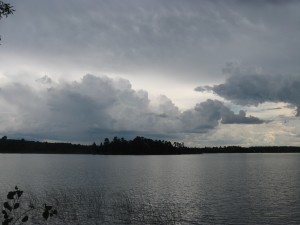 The Peace of Wild Things…
The Peace of Wild Things…
At the worship service last Saturday afternoon, my minister spoke about peace and read the poem “The Peace of Wild Things,” by Wendell Berry. It is one of my favorite poems. Some years ago I copied it out by hand onto a small card, and thumb tacked it to the wall of the cabin at Birch Hill. I sat in the darkening church, and thought about the peace of wild things, and how they bring comfort to my spirit. I thought about the cabin and summers at the lake in northern Minnesota.
At Birch Hill I awaken in the early morning and listen to the loons calling to each other across the lake. I prod myself to get out of bed, dress, and go down the hill to the lake. Most mornings I am too lazy for pre-dawn expeditions, but I am leaving the next day; this is my last chance this summer.
There are mists on the lake, and no one else is stirring. Where are the motorboats and the fishermen? I am thankful that the only sound I hear is the call of loons, not motors. I grab a life jacket and a paddle for the canoe. I push the red canoe partly off the shore and then step into the warm water before swinging my legs over the side. It is easier when I am alone to paddle from the bow, especially if there is wind, but this morning the lake is flat calm. I paddle, turning the canoe toward the center of the lake. Two loons are there, doing their own fishing. They turn their sleek black heads toward me, unafraid, then dive. They swim a long distance under water and come up closer to the canoe. I sit quietly, paddle across my legs, watching them. They are such elegant birds, with their black spotted plumage and their black-streaked white breasts.
Slowly I begin to paddle away from the loons, moving closer to the shore, toward the west. Behind me the eastern sky is turning red. Too late I realize I am very close to another fisherman: the great blue heron standing in the shallows. He is standing so still in the morning mists– gray against gray– that I did not see him until this moment. He unfolds his wings and rises, like a dignified diplomat taking his exit. As he passes over the canoe, I hear his great wings beating. He passes overhead, his great neck curled, long legs straight behind him, moving to another fishing spot.
I paddle the canoe along the rocky shore, past two cabins that were not here when I was a little girl, and past the pink cottage, where smoke is coming from the chimney. Someone is up. My friends live here, but I slip quietly past, wanting only the quiet of the early morning, not a cup of coffee.
The shore is low and marshy now, and reeds line the shore. The canoe glides through the outermost reeds, the stems whispering as they slide past the red hull. Just ahead of me I see movement in the water, and three dark heads. They are not loons, perhaps muskrat? I back paddle gently, lay the paddle across my knees again, and raise the binoculars to my eyes.
Three sleek brown heads are jutting out of the water, eyes staring at me, seemingly curious about me. They are river otter, and I have seen them only twice before over the years. I hear them squeaking but they do not sound alarmed. I remain perfectly still, filled with wonder. They swim closer to the canoe, then dive, reappearing in the area where I first spotted them, then swim further away. I do not follow, I do not wish to disturb them.
From the branch of a dead tree I hear the ca-rack call of the belted kingfisher. Across the lake, a motor boat’s engine starts up. The sun has risen and the mists have gone. I turn the canoe toward the cabin. I have been blessed once more.
Here is Wendell Berry’s poem:
When despair for the world grows in me and I wake in the night at the least sound,
in fear of what my life and my children’s lives may be,
I go and lie down where the wood drake rests in his beauty on the water,
and the great heron feeds.
I come into the peace of wild things who do not tax their lives with forethought of grief.
I come into the presence of still water.
And I feel above me the day-blind stars waiting with their light.
For a time I rest in the grace of the world, and am free.
